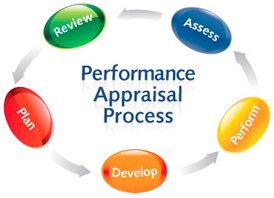Performance management in an organization is an ongoing system that encompasses the processes of setting goals and objectives for employees while ensuring that those goals are in alignment with the organizational goals and objectives, continuously observing and assessing the performance of the employees and developing them through ongoing coaching and feedback.
Performance appraisal is a part of the performance management system that is conducted annually or semi-annually and aims at rating an employee’s performance by finding out the strengths and weaknesses of the employee and how he or she has performed during the review or appraisal period.
How accurately this performance management system is implemented in an organization or how accurately the review is done by the appraiser depends on several factors. The accuracy of appraisal depends on two major factors – appraiser’s motivation and ability to review and rate accurately. Appraiser’s motivation to execute the appraisal process correctly without errors or biases and his or her ability or chances of doing so plays a crucial role in determining the reliability, validity and effectiveness of the appraisal process.
Motivation of the appraiser to rate correctly will depend on a number of factors. Appraiser’s motivation is relatively higher in cases where,
– The appraisal method is being carried out solely for research purpose and not for employee development or formal rating purpose
– The appraisal method is conducted for chalking out the development plan for en employee and not for giving formal ratings
– The appraisal and the entire PMS process is easy to grasp
– Confidentiality of appraisal rating is maintained
– Appraiser feels confident that he or she is actually aware of the performance of the employee he or she is going to appraise
– Appraiser knows that he or she will be held entirely accountable for the rating given and has to face all the consequences of the appraisal process, if any.
Similarly, appraiser’s ability or scope of avoiding unintended biases or errors while rating an employee will be higher if,
– The appraiser and the employee being appraised occupy hierarchically closer positions
– The appraiser has ample chances to observe the employee’s performance and work-related behaviour
– The appraiser has received formal training in conducting performance review processes
Thus, various factors together act as determinants to decide how accurate and error-free the performance review and management process is going to be.





3 Comments. Leave new
Need to improve more..
Nice effort.. presentation should be improved..
great effort